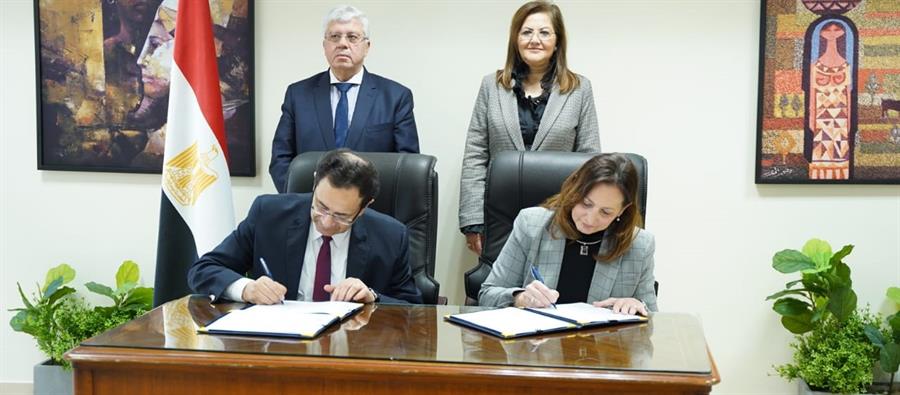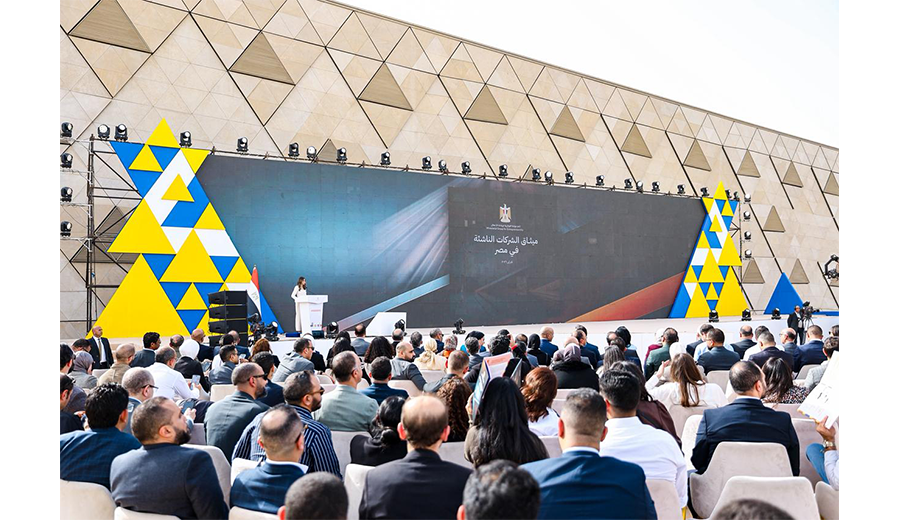Planning, Higher Education ministers Witness Signing of Cooperation Protocol for Sustainable Development

14 March 2024
H.E. Dr. Hala El-Said, Minister of Planning and Economic Development, and Dr. Ayman Ashour, Minister of Higher Education and Scientific Research, witnessed the signing ceremony of a protocol for cooperation between the National Institute for Governance and Sustainable Development – the training arm of the Ministry of Planning and Economic Development – and the Innovators Care Fund affiliated with the Ministry of Higher Education and Scientific Research. The aim is to collaborate in supporting the building and development of human capabilities, governance, and sustainable development. The ceremony took place at the Ministry of Planning and Economic Development headquarters in the New Administrative Capital.
The cooperation protocol was signed by Dr. Sherifa Sharif, the Executive Director of the National Institute for Governance and Sustainable Development, and Dr. Diaa Khalil, the Executive Director of the Innovators Care Fund.
Dr. Hala El-Said stated that the protocol stems from a full awareness of the importance of cooperation among all Egyptian state institutions, commending the role played by the National Institute for Governance and Sustainable Development in training and qualifying workers in various fields to enhance service systems and enable efficient resource management. This is in line with achieving sustainable development goals according to Egypt's Vision 2030.
She emphasized the Ministry's commitment, represented by the National Institute for Governance and Sustainable Development, to deepen cooperation with scientific, academic, and research institutions to leverage academic expertise in improving practical efficiency, applying scientific methods in capacity development programs, refining human resources' skills, conducting studies and research, providing consultations, and managing projects related to good governance, and digital transformation.
Dr. Ayman Ashour reiterated the Ministry's commitment to supporting innovation and entrepreneurship, disseminating their culture, conducting applied research to find innovative solutions to challenges faced by various sectors in Egypt. This includes establishing a scientific and technological knowledge base capable of innovation, internationally recognized, driving the knowledge-based economy for continuous progress, thus achieving sustainable development.
He pointed out that these efforts have resulted in tangible achievements reflected in international indicators. Egypt has advanced three places in the Global Innovation Index last year, praising the distinguished and effective role of the Innovators Care Fund in supporting researchers and innovators, transforming their innovative ideas into marketable products competitively. He expressed confidence that this collaboration will enhance the fund's capabilities and work towards achieving its desired mission.
The ministers emphasized that the signing comes as a continuation of the fruitful cooperation between the Ministries of Planning and Economic Development and Higher Education within the framework of the National Strategy for Higher Education and Scientific Research 2030 and the National Program for Structural Reforms. The goal is to work on various levels to build and develop human capacities in higher education and scientific research institutions, and to propose scientific solutions that contribute to the development of Egyptian society to achieve the goals of Egypt's Vision 2030.
The protocol outlines cooperation in several areas, including establishing a virtual business incubator and accelerator (Startup Egypt, the national program for incubating and accelerating startups), establishing the Egypt Observatory for Entrepreneurship and Sustainable Innovation to serve as an electronic platform for the national innovation network, establishing units to support innovation in government and social institutions, adopting a mechanism to accredit innovation and entrepreneurship centers and units that provide innovation and entrepreneurship support services, developing a national index for measuring innovation and entrepreneurship for government institutions, linking the outputs of all previous axes with sustainable development goals, developing a map for localizing sustainable development goals geographically, and establishing a network of experienced mentors to be utilized through the incubators to be adopted.
The signing ceremony was attended by representatives from the National Institute for Governance and Sustainable Development: Dr. Heba Zaki, Director of Egypt Center for Entrepreneurship and Innovation, Dr. Maha Khalil, Director of Sustainable Innovations Lab Program at Egypt Center for Entrepreneurship and Innovation, and from the Innovators Care Fund: Dr. Mohamed El-Faran, Director of Partnerships and Marketing, Dr. Amal Nasr El-Din, Project Manager, Dr. Leila Khedr, Planning and Policies Director, Dr. Ghada Khedr, Project Manager for Preparing Researchers for Entrepreneurship at Egyptian Universities and Institutes.









